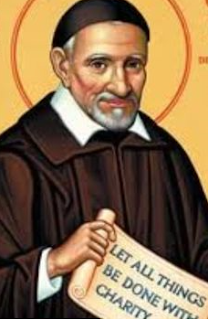This was at a time when there were not many priests in
France and what priests there were, were neither well-formed nor faithful to
their way of life. Vincent helped reform the clergy and the manner in which
they were instructed and prepared for the priesthood.
The Vincentians remain with us today with nearly 4,000
members in 86 countries. In addition to his order of Vincentian priests, St.
Vincent co-founded the Daughters of Charity along with St. Louise de Marillac.
There are more than 18,000 Daughters today serving the needs of the poor in 94
countries. He died in Paris on September 27, 1660. St. Vincent de Paul "become
the symbol of the successful reform of the French Church" and he is
sometimes referred to as "The Apostle of Charity" and "The
Father of the Poor".
Although in his passion he
almost lost the appearance of a man and was considered a fool by the Gentiles
and a stumbling block by the Jews, he showed them that his mission was to
preach to the poor: He sent me to preach the good news to the poor. We also
ought to have this same spirit and imitate Christ’s actions, that is, we must
take care of the poor, console them, help them, support their cause.
Since Christ willed to be
born poor, he chose for himself disciples who were poor. He made himself the
servant of the poor and shared their poverty. He went so far as to say that he
would consider every deed which either helps or harms the poor as done for or
against himself. Since God surely loves the poor, he also loves those who love
the poor. For when one person holds another dear, he also includes in his
affection anyone who loves or serves the one he loves. That is why we hope that
God will love us for the sake of the poor. So when we visit the poor and needy,
we try to understand the poor and weak. We sympathize with them so fully that we
can echo Paul’s words: I have become all things to all men.
Therefore, we must try to
be stirred by our neighbours’ worries and distress. We must beg God to pour into
our hearts sentiments of pity and compassion and to fill them again and again
with these dispositions."


No comments:
Post a Comment